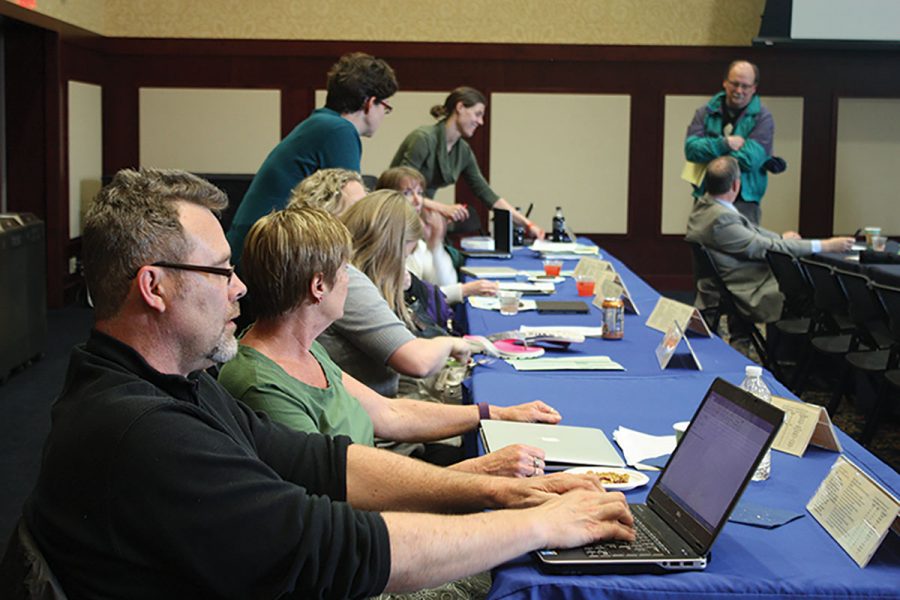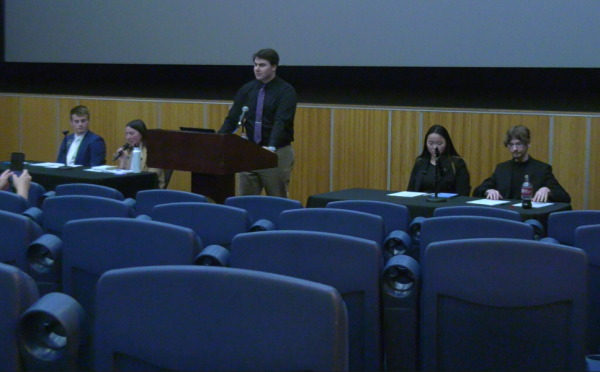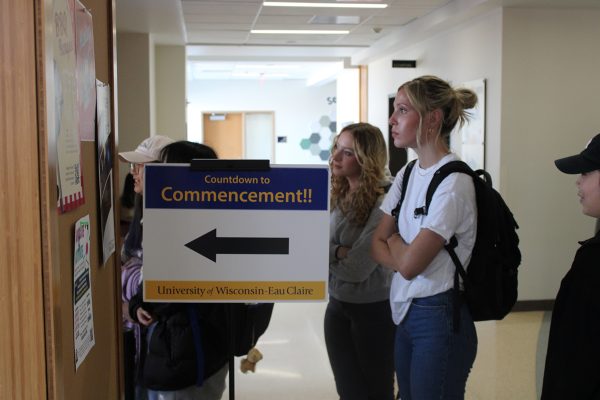University senate fails to vote on UW System resolution
Vote stalemate came after heated debate and disagreement on campus
More stories from Gabriel Lagarde
Photo by Gabriel Lagarde
Discussion became heated when members of the University Senate participated in a long, volatile discussion Tuesday regarding the fate of the Resolution in Support of the Wisconsin Idea.
Instead of closure, Tuesday’s session only offered more questions and frustration for members of UW-Eau Claire’s University Senate as it failed to pass a motion to vote on the Resolution in Support of the Wisconsin Idea.
The resolution calls for a recommitment to the Wisconsin Idea and has also been described by faculty as a vote of no-confidence against UW System President Ray Cross and the Board of Regents for their handling of the budget cuts.
The lack of a satisfactory conclusion to the debate highlights the latest episode of conflict amidst weeks of tension in the UW System.
Friction even arose between former student body president Jake Wrasse, who left office Monday, and members of University Senate.
Wrasse vehemently opposed the resolution, going so far as to pen a five page letter to members of the University Senate last week in an attempt to compel them to vote against it.
“(The Resolution) will reflect negatively on the people who make this place excellent,” he said in a phone interview.
In the letter, Wrasse described the no-confidence resolutions from across the UW System as “childish” and “amateurish.” He said the idea that Cross and the Board of Regents are working against the interest of the UW System is “so incredibly backward and irrational it is almost impossible to engage with those remarks.”
Members of the University Senate debated the controversial resolution for a large portion of the nearly three-hour meeting before the senate voted to suspend the rules and vote on the resolution.
Geoff Peterson, chair of the political science department and faculty representative, said years of frustration and perceptions of victimization by the state legislature galvanized faculty to push this resolution.
“There’s a very strong sense that Wisconsin is losing focus on the importance of higher education,” Peterson said “A big part of what this resolution was about was trying to push the regents and Ray Cross to act more aggressively and work hard to push (higher education) forward.”
In the end, the motion fell just short. While senators tallied 24-12 in favor of the vote, it failed to garner the 25 votes necessary to meet the two-thirds majority required to pass the motion.
Sen. Bob Nowlan, English professor and author of the Resolution in Support of the Wisconsin Idea, said backing the resolution was an act of solidarity with colleges across the state.
“I support joining our colleagues … in making it clear (we) strongly disagree with the direction the state of Wisconsin is headed,” he said. “We know the substantial damage of the budget cuts and what the decimation of tenure and shared governance have done.”
The resolution is one of many similar resolutions being considered by universities across the state, a tide of institutional uproar that traces its origins to a vote of no-confidence resolution crafted by Chad Goldberg, a sociology professor at UW-Madison and a member of the university’s senate, back in March.
The 2015 Walker budget cuts were responsible for unprecedented losses to the UW System — accounting for a $250 million reduction in state funding that Chancellor James C. Schmidt said resulted in the loss of 1,400 positions statewide.
Universities across the state were forced to limit course offerings, downsize staff, cut funding for organizations like the UW Extension and halt institutional growth, the chancellor said.
He said these cutbacks, coupled with the UW System becoming increasingly uncompetitive in attracting or retaining quality instructors, damages the quality of the education the system provides and compromises the future of the state economy.
Frustrations reached a breaking point when the Board of Regents approved a series of changes to the state’s tenure policy in March that stripped many of the protections professors had previously enjoyed.
Sen. Jeff Erger, a professor of sociology, expressed his disapproval of the tenure changes at the meeting.
“Previously, the consequences (of tenure review) were I either got a couple thousand dollar raise or nothing or something in between,” Erger said. “ … now, it’s either a little raise, no raise or firing me.”
The Board of Regents and UW System President Ray Cross — who praised the tenure changes — were harshly criticized for allowing what many perceive is an attack on the academic freedom of university faculty.
“The case against President Cross is clear and convincing,” President of the UW-Madison chapter of AAUP David Vanness said in an email message to colleagues, according to the Cap Times. “He has been intentionally deceptive in his reassurances about mitigating the effects of massive system-wide budget cuts and preserving tenure and shared governance.”
In the intervening weeks, faculties across the state resolutions of no-confidence against Cross and the Board of Regents, many times with overwhelming support. UW-Madison approved itsresolution with a tally of 16-5-2. UW-La Crosse, UW-River Falls and UW-Milwaukee backed its resolutions unanimously, according to the AAUP website.
However, despite the widespread support of these resolutions, there were enough detractors to stymie the Eau Claire resolution Tuesday.
Sen. Jason Anderson, assistant director of conferences and event production, shared the frustration of his colleagues, but warned the resolution threatened to hamper dialogue with the state legislature.
“When we look at the negative reactions that have happened to campus that have passed similar resolutions that have no binding authority, it would handcuff us as UW-Eau Claire moving forward,” he said. “It would have hindered us in what we can do in terms of building projects and providing a world-class education.”
In his letter, Wrasse went on to defend Cross and the Board of Regents in regards to their dealings with the state legislature. He said the sizable reduction in the final budget cut and negotiated flexibilities are evidence of Cross’ work for the system.
“Ray Cross and the Board of Regents have done a wonderful job in an incredibly difficult, unprecedented situation,” Wrasse said. “If Cross had been honest and upfront during the time, it would have severely affected morale and the outcome of the budget cuts would have been far less positive.”
Wrasse said he hoped the failure of the motion to vote on the resolution would give members of the faculty time to reevaluate the situation and come to a more dispassionate, educated conclusion.











